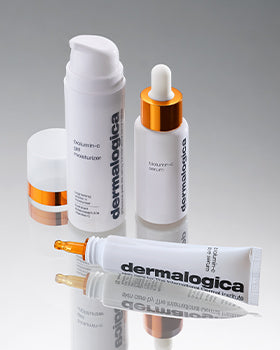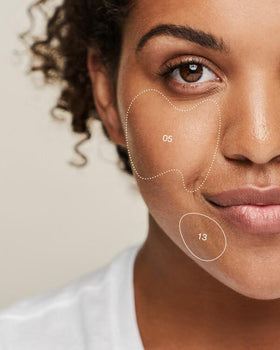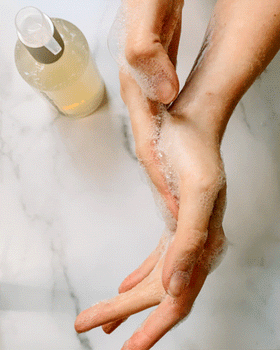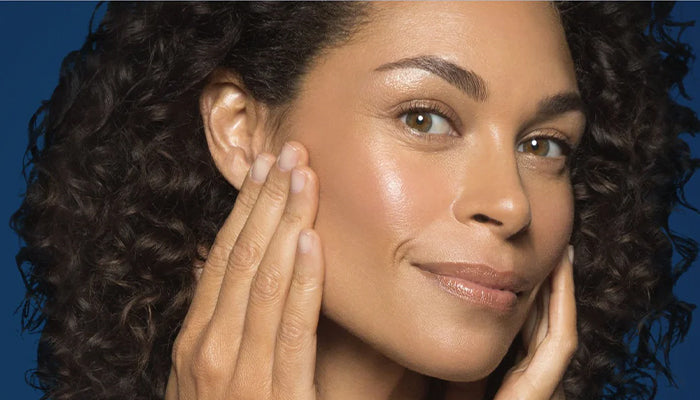Ageing skin happens to us all but we’re not fans of the term ‘anti-ageing’ at Dermalogica, not only is it ageist, it’s also misleading. Miracle cures for wrinkles or ‘Botox in a bottle’ claims are simply not good science. Wrinkles, fine lines, dullness, dark spots, dryness and loss of tone are all part of the natural ageing process. But did you know, recent studies show that up to 50 % of visible signs of skin ageing come from your ‘exposome’ – a combination of lifestyle and environmental factors. So, the good news is, with the knowledge and know how, you can keep your skin looking great for its age!
Story highlights
- Understand how and why your skin ages and the factors within your control to minimise premature skin ageing
- What the common signs of skin ageing are and how to target them
- The top products and key ingredients you need to help preserve your skin’s youth in your 20’s and 30’s versus when you’re 40 plus
How and why skin ages
Our skin starts to age as soon as we are born, but we don't typically think of it as ageing until it starts to show dullness, fine lines, wrinkles, and dark spots. What causes these visible signs of ageing is rather complex and varies according to your genetics and your exposome (lifestyle + environment). It’s true that some will age better than others due to ‘good’ genetics, however, the impact of stress, UV exposure, pollution, diet, sleep, smoking, hormones, and general health over one’s lifetime dramatically influences how well (or not) your skin ages regardless of genetics.
Skin ageing through the decades
20s
Skin can start to age as early as our 20s. Unhealthy lifestyle habits, environmental damage and UV exposure begin compromising skin's structural integrity. Our cell defences start to weaken in the face of free radicals, and our natural ability to fight off skin damage declines. Cell renewal and turnover rates also naturally start to slow, diminishing skin radiance.
30s
In our 30s, collagen (which keeps skin firm) and elastin (which keeps skin bouncing back) degrade, resulting in visible wrinkles. In fact, we lose around 1% of our collagen per year! Cell renewal and turnover continue to decline, leading to a duller complexion and uneven skin tone. Some cells can even become inactive, or turn into "zombies," giving rise to damaging inflammatory toxins that accelerate the appearance of skin ageing.
40s
By our 40s, skin appears thinner and its naturally protective barrier lipids are not as pronounced. Dehydration and dryness can be an issue. Depending on hormonal activity, (many women go through the perimenopause in their mid-40’s) unusual activity may appear in skin from uneven skin tone to breakouts. More prominent signs of skin ageing can also appear, such as dark spots and significant dullness.
50s+
After our 50s, our barrier lipid layer lessens, leading to less efficient moisture retention and more potential for sensitivity and dehydration. Chronic stress and inflammation both inside and outside of the body delays skin recovery – leading to lasting marks and longer healing times. By now, skin can show prominent wrinkles, fine lines, and discoloration. For women, the impact of the menopause can cause dramatic changes, with studies showing that women’s skin loses about 30% of its collagen during the first five years of menopause.
Exposome impact
With up to 50% of what we see as visible signs of skin ageing coming from our ‘exposome’, it makes sense to include strategies alongside skin care to minimise this lifestyle and environmental impact.
Key causes of premature skin ageing

|
UV exposure is the top cause of skin ageing. UV ray’s breakdown essential skin proteins such as collagen leading to lines, wrinkles and worse case, skin cancer. UV exposure also causes skin discolouration, seen as dark spots or ‘sun’ spots. Pro tip! Wear a high SPF daily. |
|
Stress triggers inflammatory processes in the body and skin and can dramatically reduce the skin’s ability to heal. Even low-level inflammation over a period of time impacts the skins regeneration processes, resulting in reduced collagen and lipid production. Pro tip! Incorporate regular practices to manage stress levels such as meditation or exercise. |
|
|
Smoking can dramatically age the skin due to the intensive hit of free radical damage. Smoking also starves the skin of Vitamin C which is essential for collagen synthesis. |
|
| Lack of sleep can cause premature ageing of the skin and body due to inhibiting the cellular repair that happens whilst we sleep. Pro tip! Prioritise sleep and keep to a regular time for going to bed and waking. Try a sleep meditation or binaural beats track if you struggle to switch off. | |
|
Pollution particles are microscopic and can penetrate skin via our pores. This triggers the skins inflammatory processes, resulting in ‘inflammageing’. Pro tip! Include antioxidants in your regimen to minimise the oxidative stress associated with this free radical attack. |
|
|
Poor diet high in sugar and lacking in vitamins and nutrients impacts skin health. Sugar in the body reacts with proteins in the skin like collagen via glycation. This causes collagen breakdown and leads to lines and wrinkles. Pro tip! Reduce sugar intake and fuel your body and skin with fresh, non-processed foods. |
|
|
Hormones impact skin in many ways and for women, a drop in oestrogen through the menopausal years dramatically decreases collagen production leading to wrinkles and dryness. Pro tip! Get educated and seek help with menopausal symptoms and supplement your skin care with skin regenerating Peptides and Retinol. |
Top product picks for preserving your skin’s youth in your 20-30’s
daily glycolic cleanser
To brighten skin and restore glow, include a daily use cleanser with Glycolic Acid to rinse away skin dulling debris and keep skin renewal at optimum.
biolumin-c serum
Add a Vitamin C serum into your regimen to brighten, firm and defend. Vitamin C is a potent antioxidant and skin brightener, offering increased defence from skin ageing environmental factors such as pollution.
prisma protect spf30
With exposure to UV rays at the top of the list for skin damage, apply a broad spectrum SPF30 to defend against both UVA and UVB rays. Added antioxidants and skin hydrators will keep skin protected and luminous.
Top product picks for restoring the nature of younger looking skin in your 40’s+
rapid reveal peel
Step up exfoliation to boost cell renewal with a maximum strength at-home peel. Potent Lactic Acid and plant enzymes kick start cell regeneration to smooth, brighten and firm the skin.
dynamic skin retinol serum
Retinol is the skin care gold standard ingredient to help reverse signs of skin ageing. To avoid irritation commonly associated with Retinol, use the buffer cream to allow skin to acclimate. Use as part of your night-time regimen only.
dynamic skin recovery spf50
Defending the skin year-round from damaging UV rays is critical for minimising skin ageing. Dynamic Skin Recovery SPF50 ensures a high level of defence, complete with skin regenerating peptides in a highly moisturising formula.
Professional advice
For a personalised prescription and expert advice chat live to one of our qualified Skin Therapists here or book for a complimentary virtual 1-2-1 skin analysis with Face Mapping here: Face Mapping - Online Skin Analysis



